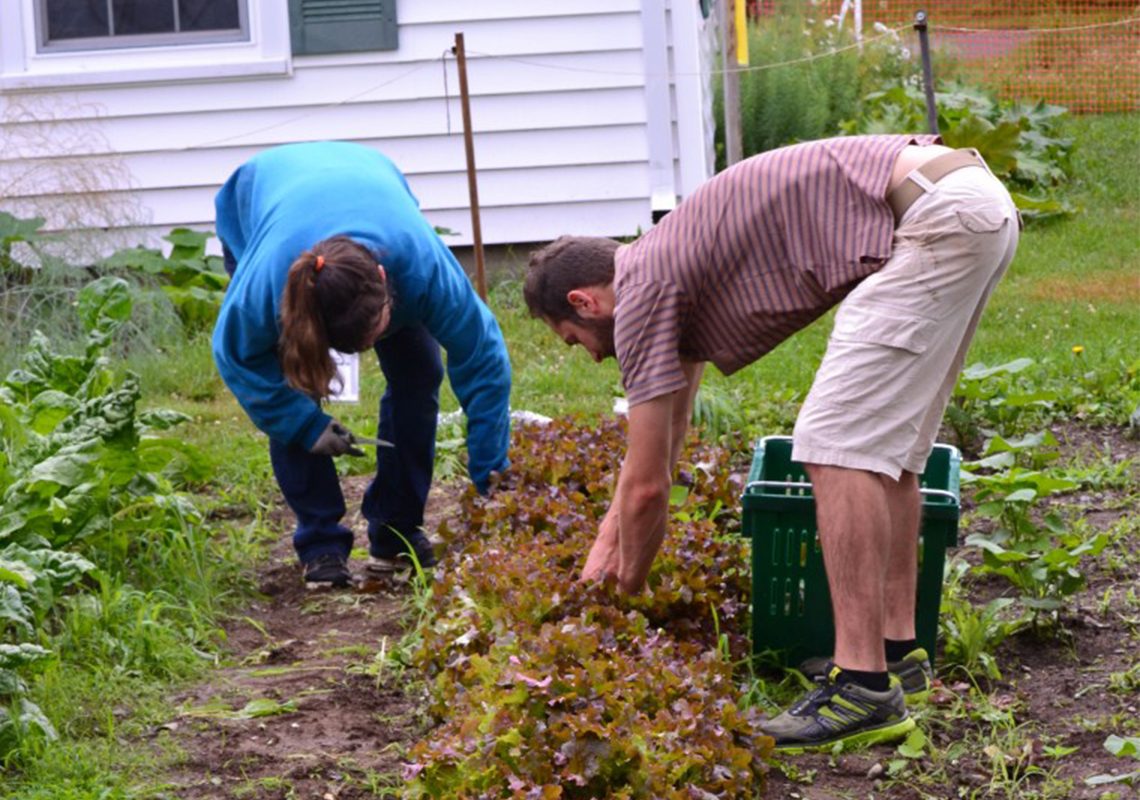
UMM Gardens Helping with Food Insecurity in Washington County
MACHIAS, Maine — Early each morning, while the leafy greens are still wet with dew, volunteers head into the two gardens on the University of Maine at Machias campus – one at the O’Brien House and a second behind Torrey Hall – to harvest the day’s bounty: lettuces, chard, kale, beans, carrots, squash, asparagus. Every bit of food grown in the campus gardens – hundreds of pounds – is donated to local food pantries.
Food insecurity is a major issue in Washington County and by participating in a unique collaboration with area food agencies, UMM is striving to be part of possible solutions. “”Washington County is food insecure,” said UMM’s Asst. Professor of Community Studies, Dr. Jamie Moreira. “That is a fact of the economy here. UMM doesn’t just teach; it is part of the solution. We are leading by example.”
Organizers are confident that the 2,100 square feet of gardens will yield more than 1,000 pounds of food to feed Washington County families this season through area food pantries, thanks to a working collaboration between UMM, Healthy Acadia, Community Caring Collaborative, the UMM Food Recovery Network, and the University of Maine Cooperative Extension.
“Over the past 18 months, we’ve developed solid working relationships with food banks and other community agencies from Lubec to Milbridge. Adding campus grown produce to that effort seemed a great fit.”
UMM emphasizes “applied” scholarship, which means that teaching methods include a strong dose of hands-on, practical learning.
“For the greenhouse and gardens project, it’s not just about growing the food, though that’s part of it,” Moreira said. “It’s also about working actively in the coastal region to understand challenges like food insecurity through direct experience, and to do our best to be part of the solution.”
[blockquote align=”right”]
“The revival of the greenhouse and gardens is almost entirely due to the work of the UMM Food Recovery Network, which was founded in 2015 by Psychology and Community Studies major, Linda Barsanti,” Moreira said.
[/blockquote]
“This effort is a wonderful opportunity for students to engage in experiential ‘service’ learning, and to contribute actively to the wider community, which is an important aspect of our mission,” UMM President Sue Huseman said. “I applaud the faculty, students and community agencies involved.”
Moreira said the greenhouse and gardens were established in 2011 by the UMM Sustainability group but funding was cut and the gardens were idle for several years.
“It’s fantastic to see them up and running again, and we couldn’t have done it, especially not during the summer, without the partnership with Healthy Acadia and Regina Grabrovac’s Gleaning Project.”
Grabrovac said increasing fresh food access to low-income families and individuals is the primary Gleaning Initiative goal of the UMM garden collaboration.
“What is special about this collaboration with many wonderful partners is the energy and momentum,” she said. “People have come from many sectors to help make this garden happen- from UMM graduates to Machias Savings Bank employees; from Master Gardeners and members of the Beehive Collective to enthusiastic teenagers. We needed fencing and Jonathon Berry made it happen. Mowing? Linda Barsanti arrives with her mower. Watering in the greenhouse? There is a scheduled list of people who water it.”
This community collaboration to feed each other is working successfully, Grabrovac said.
“I love arriving at the garden. I don’t know who will be there but someone always is, and we have a great time. I feel confident that with so many people chipping in to make this happen, that this project will keep it going for a long time.”
